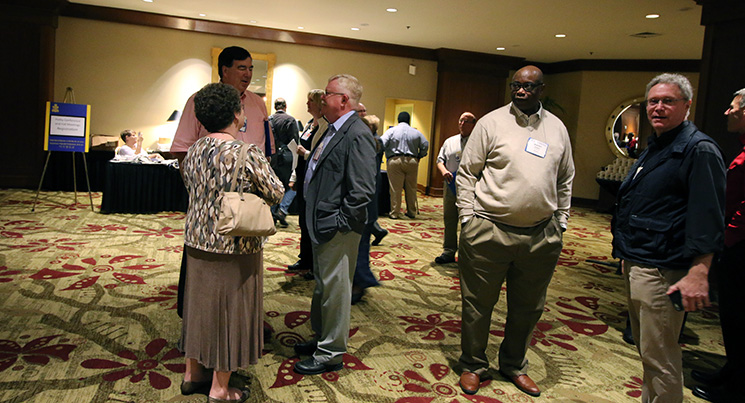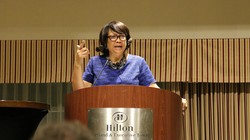In a rapidly changing church and world, no one is exempt from fear and anxiety, the Reverend Veronica Goines told more than 430 leaders of Presbyterian Church (U.S.A.) presbyteries and synods gathered in Portland, Oregon, for the annual Polity Conference and fall meetings.
“If we don’t stay on our knees, we will not make it,” said Goines, pastor of St. Andrew Presbyterian Church in Marin City, California. She preached at a worship service that opened the joint gathering.
“So many of us went into ministry for an ideal, and it’s turned out to be an ordeal, and we want a new deal,” Goines said. But, “It’s better to be in the mess with God than to be in the clear without God.”
She reminded worshipers of the testimony of Psalm 27:1: “The Lord is my light and my salvation; whom shall I fear?”
“The church is exactly where it’s supposed to be,” she said—in a place where people are hurting. “And God is in the mix with us.”
Over the next three days, mid council leaders gathered in Portland—site of the 222nd General Assembly (2016)—will worship, learn, and share ideas about how to respond to the shifting landscape of the denomination.
 The October 9–12 gathering includes the Polity Conference, preceded by five other mid council leader events meeting concurrently for the first time: the Moderator’s Conference, the Association of Mid Council Leaders annual meeting, the Association of Stated Clerks annual meeting, New Stated Clerks training, and the General Assembly Committee on Representation training event for synod committees on representation.
The October 9–12 gathering includes the Polity Conference, preceded by five other mid council leader events meeting concurrently for the first time: the Moderator’s Conference, the Association of Mid Council Leaders annual meeting, the Association of Stated Clerks annual meeting, New Stated Clerks training, and the General Assembly Committee on Representation training event for synod committees on representation.
Event planners say one goal of the streamlined schedule is better stewardship of time and money.
“When I started as a presbytery executive twelve years ago, there were at least four national meetings that mid council leaders might be expected to travel to in the fall,” says Sue Krummel, who is now director of mid council relations for the Office of the General Assembly.
These stand-alone, separate meetings were scheduled at different times and in various locations. A few years ago, an attempt was made to consolidate some of these conferences by offering them in the same location, before and after the Polity Conference.
However, Ruth Clendenin, stated clerk of Palo Duro Presbytery, notes that this still meant she and other mid council leaders would be away from home attending “conferences strung across a period of seven to eight days.”
Clendenin says that shortening the Polity Conference and having the other five events meet concurrently is an attempt “to conserve and streamline the resources we have available.”
But an even more important goal is strengthened leadership for the church, she says. The new format includes time for meeting separately as well as for conversation among the various groups. There will be opportunities for mid council executives, moderators, and stated clerks to worship and share meals together and to participate in more formal discussions.
“We’re trying to be intentional in encouraging working together as partners in ministry rather than as separate entities,” Clendenin says. “If we connect with each other for help, we can be stronger and better.”
Reformed theology emphasizes the connectional nature of the church, she adds. “None of us is called to do this by ourselves. We need each other.”
Strengthening these connections is vital at a time when “mid councils are in such transition and flux,” says Jeff Hutcheson, president of the Association of Mid Council Leaders. Some presbyteries have combined the executive and stated clerk into one paid staff position. A few have eliminated all paid staff. Many have moved away from the title “executive presbyter” to reflect a less bureaucratic style of leadership. Hutcheson’s title, for example, is pastor for mission and vision of the Presbytery of San Francisco.
“It seems we’re in a time of transition in the church,” Krummel says. “We’re hoping mid council leaders will be able to have conversations about the struggles they’re having and the solutions they’re finding.”
“Often there is a perceived hierarchy among leaders,” says Clendenin. For example, employed staff may be seen as outranking elected leaders. “I think it’s important that we find ourselves on the same level. We’re coming into the room together as equals.”
Lynn Hargrove, stated clerk of the Presbytery of New Covenant, says she hopes that bringing together so many mid council leaders will build relationships and trust among individuals who may not have a history of working together.
“It’s always good to hear from other people on a similar journey,” she explains. She hopes the conferences “will help us realize that we’re living into the future of the church, and that we don’t have to be afraid.”
Hutcheson says he is hopeful about the church’s future. “I think God is at work in and through our churches and our denomination. I think Christ is leading us to a new freedom and a deeper joy.”
He adds, “The mission field is ripe. We’re just trying to figure out how to align our structures to respond to where Christ is leading.”
Follow the Polity Conference and fall meeting events here and on Twitter at presbyga, #policon15.

